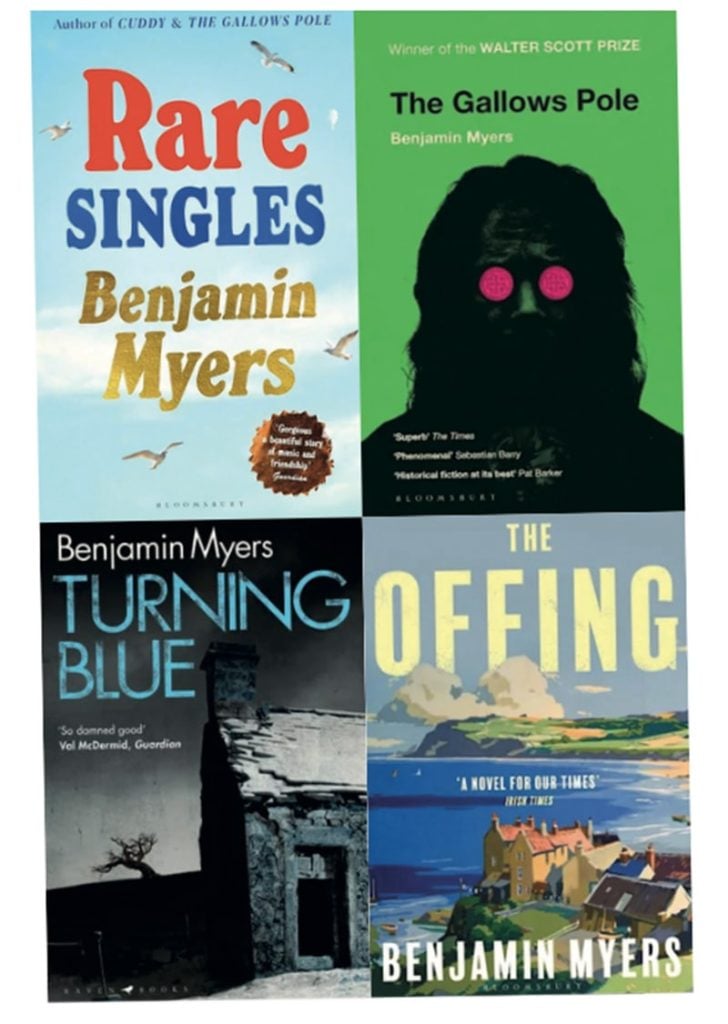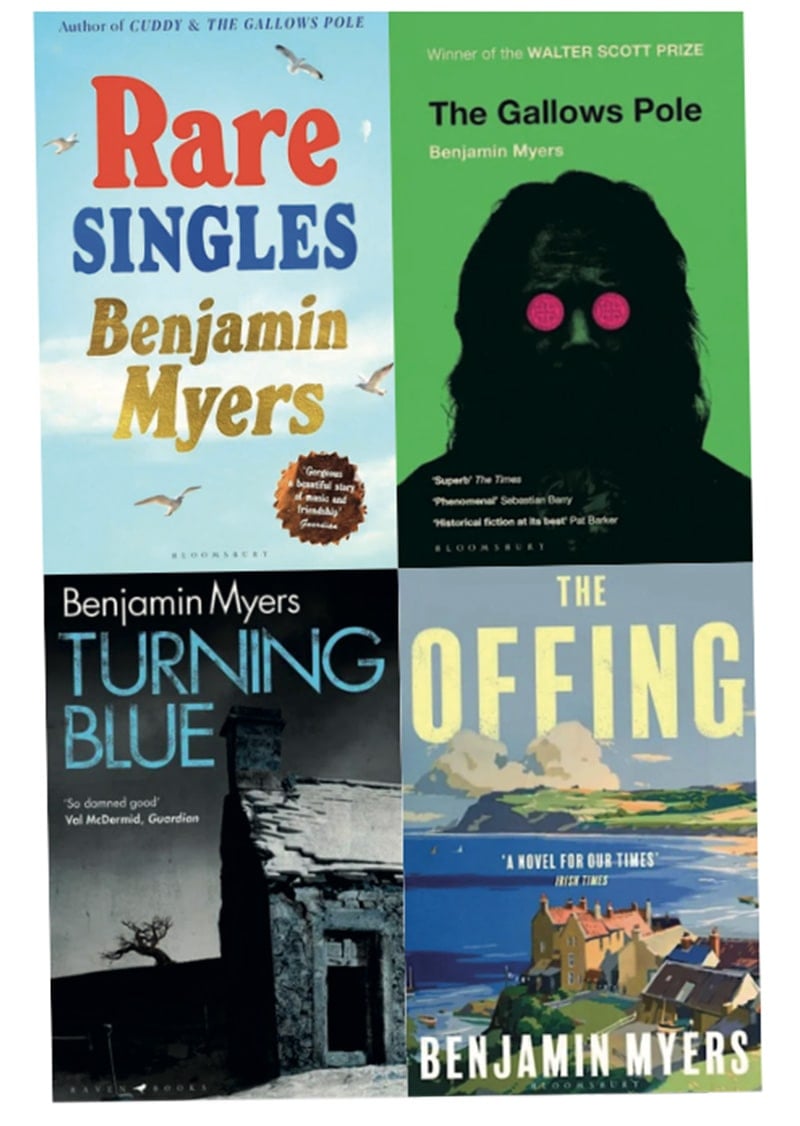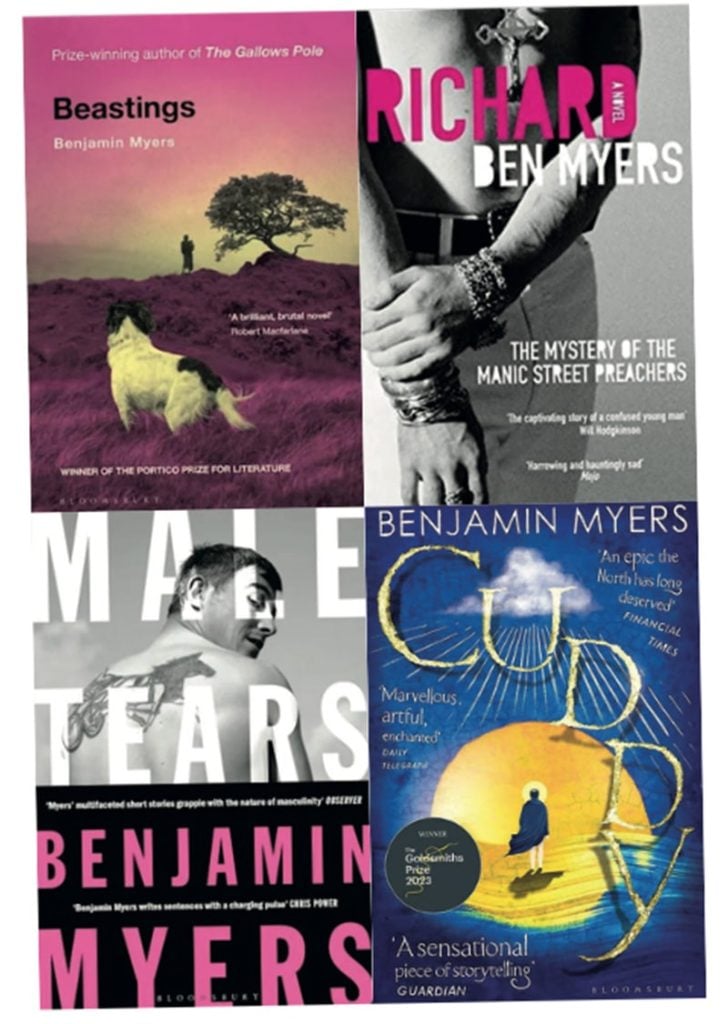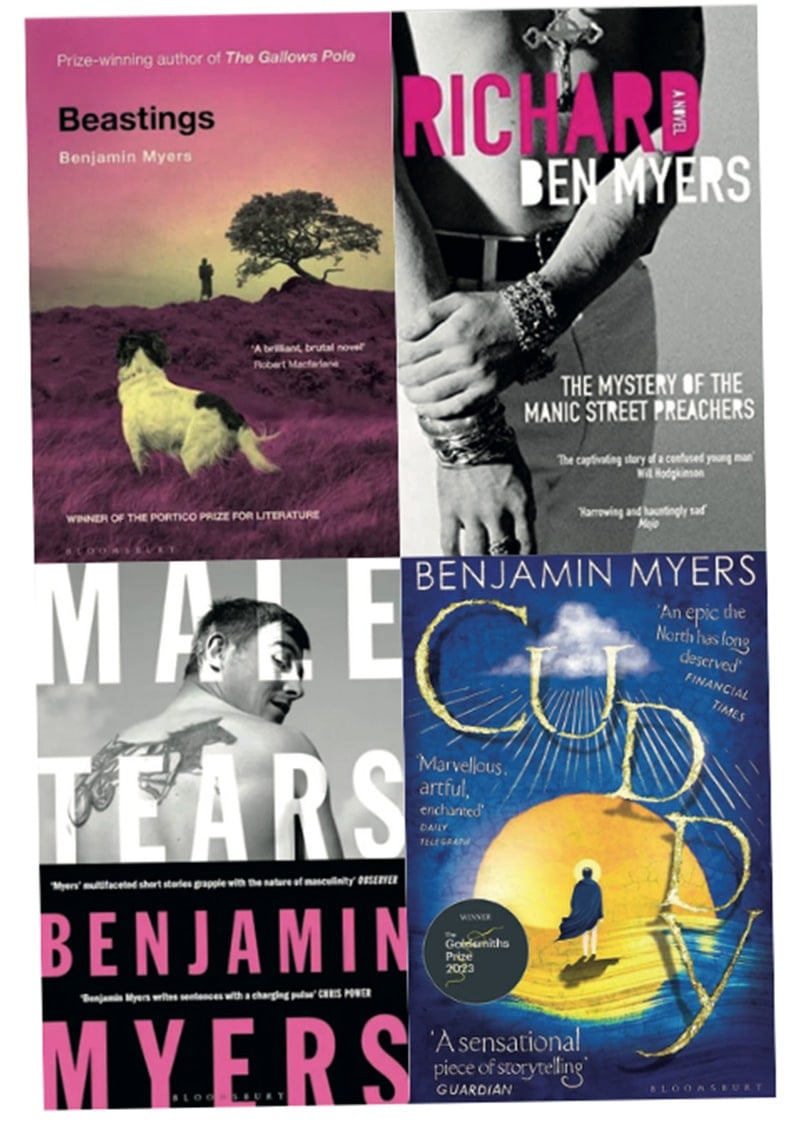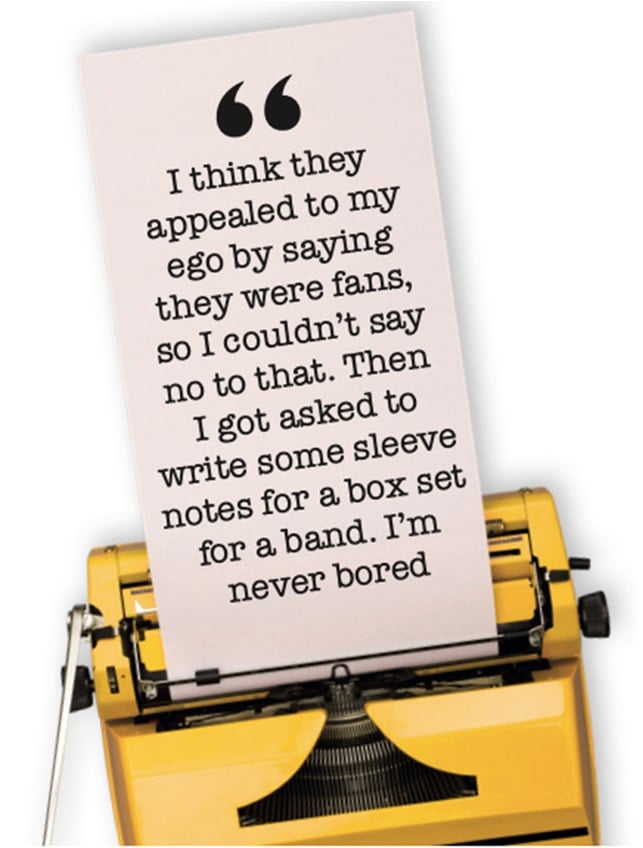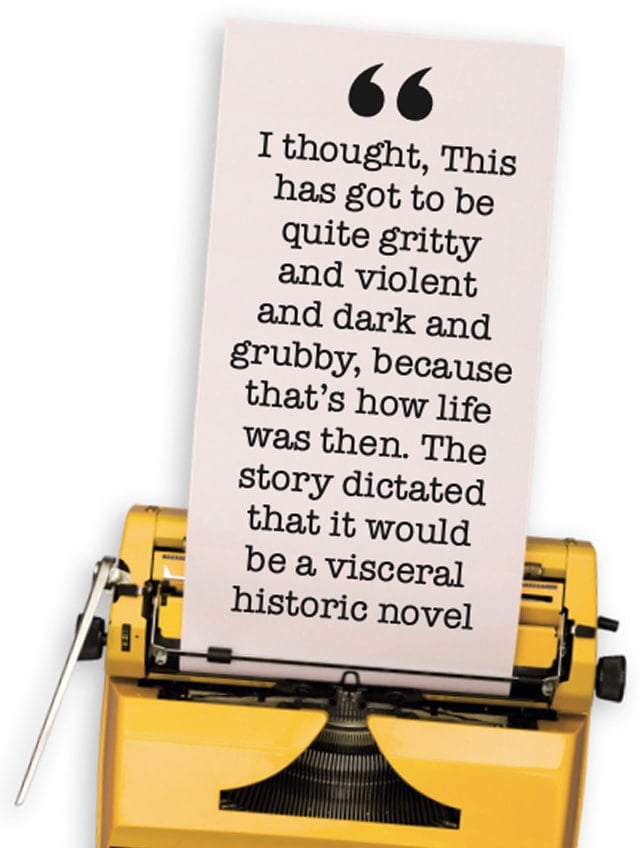You need to shake the etch a sketchAn interview with author Benjamin Myers
Words by Gary Inman
Illustration by Andy Garside
First published in Issue 3 of BOTHER magazine December 2024
When we talk, Benjamin Myers is on an ad hoc and unadvertised tour of independent bookshops of northern England. The Whitby Book Shop; Waterstones in Scarborough; Wave of Nostalgia, Howarth… He turns up, chats, signs some of his books, poses for a cheerful photo, and moves on with the rest of his day. It seems like the antithesis of the image of 21st-century high-profile book publishing, and the polar opposite of The One Show red sofa or the strained bonhomie on a top-ten podcast.
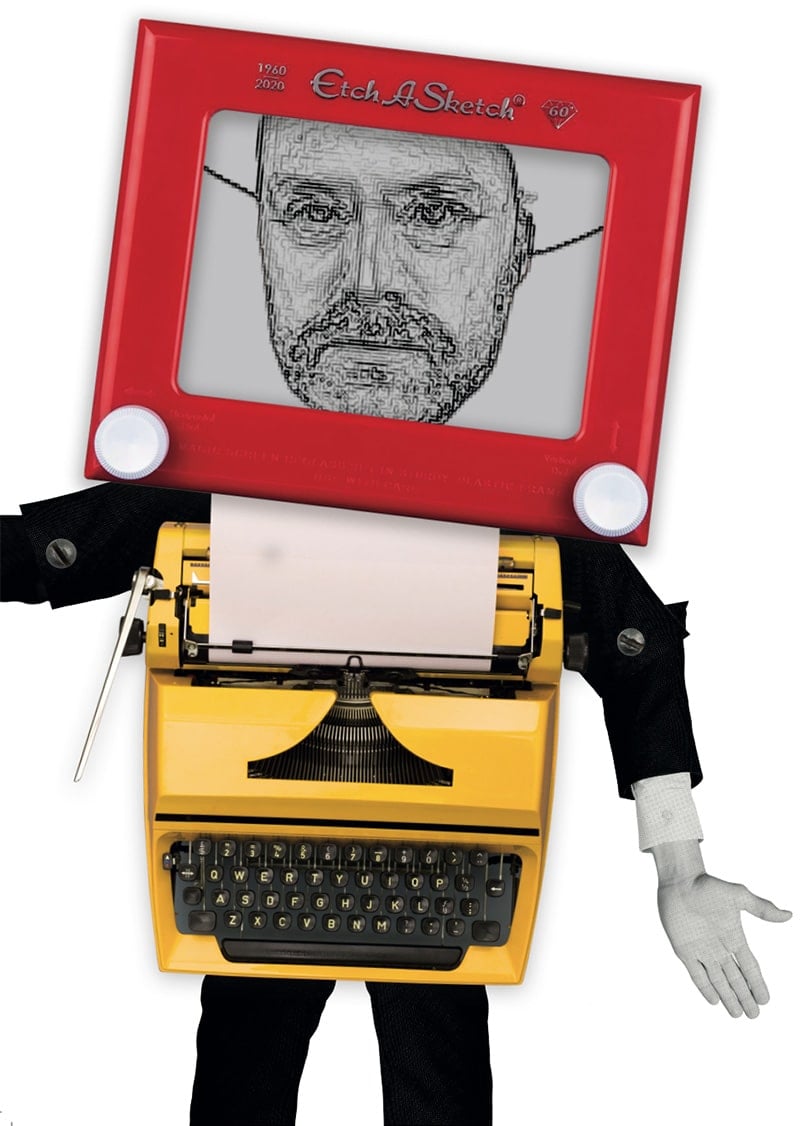
‘They’re the lifeblood of publishing, the booksellers, the bookshops,’ says Myers. ‘There’s a perception that it’s all about how much press the writer gets or if you can get on TV or radio, but if you’ve got some shops onside then it’s as good a start as you can get for a book.’
The author is clearly not taking any success for granted, even though others in a similar position might. He and his books have won multiple awards. His best-known novel, The Gallows Pole, inspired the 2023 Shane Meadows-directed BBC mini-series of the same name. Another of his books, The Offing, is being made into a film starring Helena Bonham Carter, while his latest release, Rare Singles, has been optioned by Warners/Class 5 to be turned into a movie. Meanwhile, Myers seems to work on a schedule of releasing a book a year. Isn’t this novel-writing thing supposed to be difficult? Like giving birth to a triceratops or something? ‘It’s not painful, I love it. I wouldn’t do it if, for the most part, I didn’t enjoy it. It’s all I can do, really,’ he admits.
‘I’m 48 now, so I feel like I’m beyond the point of no return career-wise. If I had to get a job, I’d be fucked.’
He reckons the impression of him writing quickly is an illusion. ‘Cuddy took about five years to write, but it wasn’t continuous. I worked on it for a couple of years, and then I stopped and wrote The Perfect Golden Circle really quickly, then came back to Cuddy. Most of them take about a year and a half.’
No Dry Biscuits
Similarly prolific authors tend to write genre fiction, often with the same main characters. That style could not be further from the case with Myers. His range defies categorisation. Cuddy spans a 1300-year period and is tethered to the story of St Cuthbert (who died in 687). If that sounds like a dry biscuit of a book, I would have agreed, but it’s an incredibly engaging 464-page slab that I read sandwiched between something by Richard Osman and a biography of Billy Childish, so I’m no history scholar.
Pig Iron (2012) is a contemporary story of a gypsy lad trying to go straight after being released from prison. The Gallows Pole elaborates on the true story of the real-life Calderdale counterfeiters from the 17th century, the Cragg Vale Coiners. While The Perfect Golden Circle is about a pair of Falklands War veterans making crop circles. His next release is about the German actor, Klaus Kinski. Pigeonhole him, I dare you.
‘It takes its toll, spending your time in those imaginary places’
‘I don’t think too much about genre, because I think of all my books as part of a greater body of work with certain themes running through them. I have written a couple of novels which are clearly sort of crime novels, but everything else just depends on where my head is at a particular time. When I wrote The Gallows Pole I knew I wanted to tell this story that’s local to Calderdale [where he lives] and takes place on the doorstep of where the Hebden Trouser folk are based. As I embarked on that, I thought, this has got to be quite gritty and violent and dark and grubby, because that’s how life was then. The story dictated that it would be a visceral historic novel. After that, I felt I needed to write something that would be a bit sunnier, more hopeful and more uplifting, just for my own selfish reasons, because if you write a lot of dark literature, it can get to you. It takes its toll, spending your time in those imaginary places, so I thought, I’m going to write something that I won’t feel terrible by the time I finish it. I’ll feel like I’ve been on holiday or like I’ve been laid in the sunshine for a bit, but when I finished it I was completely knackered.’
The sunnier novel is The Offing, the one soon to be released as a film. It’s set immediately post-world war two in Robins Hood’s Bay, and charts the unlikely friendship of a 16-year-old boy and an older woman.
‘I probably underestimated how much work was required.’
Write To Discover
The clichéd advice given to would-be novelists is ‘write what you know’. Myers is either ignoring that or knows a hell of a lot. Which is it? ‘I used to think that was good advice, but now I’ve realised that I tend to write about something that I’m interested in discovering more about. Although I worked as a music journalist for years, I’ve never written about Northern Soul, so my recent novel, Rare Singles, is set in and around a Northern Soul weekender in Scarborough. If I was a big fan or expert in that genre, I don’t think I would have written a book. I write to discover music, in the case of this book anyway. It’s set in a town I’m familiar with and spend a lot of time in, but covering a subject that I was just researching as I went along. So, I would say it’s more about writing what you’re interested in.’
When it comes to genre, Myers sounds like he barely even considers it. ‘Actually, this morning I was just trying to decide what is this book [I’m writing]? Is it a parody? Is it satire? Is it historic? Is it comedic? And I thought, I don’t really know what it is. I just know that I want to write it, so I will. I feel quite lucky in that readers generally seem to go along with what I put out. Some books are better-received than others, but I don’t think they generally put too many people off quite so much that they don’t come back and try the next one.’
Myers uses the word lucky, lucky that readers come back to him, but he isn’t. He’s just very good. Readers can get in a rut, not wanting to take a risk with an unfamiliar genre, so stick to what they know. Because he tacks from era to era, subject to subject, the only constant is his name on the cover, and the quality of his story-telling. It’s not a unique approach for a writer, but it is unusual.
Some authors are admired for their exhaustive research and painstaking historical accuracy. Myers doesn’t sound like he necessarily needs to do that.
‘It’s a bit of a danger… Some writers will spend a year in libraries just reading about [the background]. I can’t. [My fear is] I’ll study something so closely that by the end I’ll think, I don’t want to write this now, I’m sick of the subject. I just need to write as I go and learn as I go, and not be crippled by the nth degree accuracy.’
Pressure Off
Uncrippled, he gets up and writes. ‘Well, I usually wake up feeling tired and a bit depleted, but that’s just because I’m not a morning person. I’m writing a couple of books at the moment, but there’s no book deal or contracts in place. I’m lucky in that I’ve got enough to get by while working on these things, or money coming in from past projects or whatever, so there’s no real deadline and no one waiting for anything from me. That takes the pressure off quite a lot. And because I had a book out just a few weeks ago, I definitely don’t feel like I need to be writing at the moment. Doing these bookshop visits and stuff is just a way to stop myself writing. I have to tell myself it is work of a different kind, less tangible.’
For someone who seems so productive, Myers says he gets up each day without much of a plan, other than he’s going to write, probably have a sit in his mini-sauna and, if possible, go for a quick swim in some very cold water. His background is music journalism, having been a staff writer at the Melody Maker – where he received a death threat from Goldie, for an unfavourable review – also working for Kerrang! and contributing to many more music and lifestyle titles. And he still makes time to write short-form features, sometimes for The Guardian, but most recently for Radiohead’s Thom Yorke, a piece for an exhibition catalogue for the artwork Yorke has produced in collaboration with Stanley Donwood.
‘I think they appealed to my ego by saying they were fans, so I couldn’t say no to that. Then I got asked to write some sleeve notes for a box set for a band. I’m never bored. Things just come up. That’s the upside of the freelance life.’
Hit Reset
And the sauna? It’s the size of an old, red phone box, sits in his office, and has become an important tool to defuse the feelings of anxiety Myers has experienced since an early age. ‘There’s no plumbing or anything. You just plug it in and heat it up. I’ll go and sit in there, sweat like a maniac for half an hour every night, and then have a cold shower. [After] it feels like I’ve run ten miles or done loads of yoga.’
A swim in the reservoir offers a similar mental reset.
‘There’s something about the shock of the cold that brings the mind and body into a kind of quieter sort of place. It’s like when you shake an Etch A Sketch, and it clears everything. Sometimes you just need to shake the Etch A Sketch and do something that brings a bit of perspective back.’
